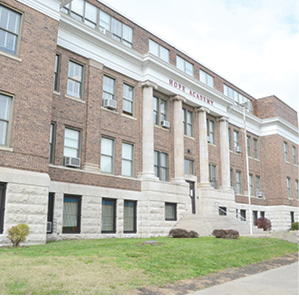
By LESLIE COLLINS
Northeast News
November 13, 2013
Hope Academy Charter School is facing scrutiny after state education officials found several “red flags.”
Prompted by Hope Academy’s unusually high attendance rate and subpar academic performance, Department of Elementary and Secondary Education (DESE) officials conducted a surprise visit Oct. 9.
Hope Academy, which operates two Kansas City campuses, including one in Northeast, reported a 99.5 percent average daily attendance rate and stated 11 percent of its student population had perfect attendance. The state’s average for perfect attendance is 3 percent, said Sarah Potter, communications coordinator for DESE.
When DESE visited in October, only 174 out of the 636 students were in attendance.
“We looked into those students they said had perfect attendance and took a sample of records, and most of the students had been absent in that six day sample of records we had,” Potter said. “So, that was a concern to us that attendance was not being accurately recorded.”
Potter said schools receive state funding based on the number of students enrolled and average daily attendance rates.
“You’d be getting more money if your kids come to school more and you have more kids enrolled,” she said.
Northeast News reached out to Hope Academy, but the school did not return Northeast News’ phone calls.
According to Hope Academy’s website, the school is a drop out recovery charter sponsored by the University of Missouri-Kansas City (UMKC) and caters to students ages 16 to 21 in grades ninth through 12th.
Another concern of DESE’s included “discrepancies related to service learning.” Service learning is a community service related project that incorporates curriculum and includes specific goals, Potter explained. One example could be creating a community garden and learning about biology as well as the seasons, she said. The state reimburses schools for those hours of learning.
“Some of the things they were reporting were not eligible to be included for reimbursement. They were reporting things like after-school jobs, babysitting and hair braiding,” Potter said.
According to DESE, less than 20 percent of the students scored in the proficient range on state assessments in English. In mathematics, 90 percent of the students failed to score in the proficient range.
“The charter school’s low academic performance combined with testing integrity issues and credits given for non-standard service-learning jobs raised concerns about the school’s academic integrity,” DESE stated in a press release.
DESE notified UMKC of its findings on Nov. 1, and it’s up to UMKC to decide where to go from here, Potter said.
“At this point, we’ve found some irregularities; we’ve taken a snapshot of their attendance records and we’ve turned it over to their sponsor and said this is really their responsibility to look into that,” Potter said.
Hope Academy’s Board of Directors has hired an external auditor and placed its administrators and some staff members on leave. LaQuanda Carpenter, principal of the Bennington campus, has been appointed interim superintendent. DESE said UMKC has created a plan to allow students to finish out the 2013-2014 school year.
DESE does not have the authority to shut down the charter school, Potter said, adding that it will be up to the discretion of UMKC. Hope Academy’s renewal application is due in February.
“At this point,” she said, “we don’t even know if the sponsors will turn in an application for renewal.”

















